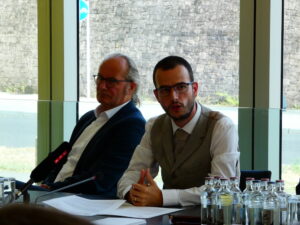Decarbonising transportation is a cornerstone in the transition to sustainable energy. In this context, Fondation Enovos, under the aegis of Fondation de Luxembourg, provided support to the INDUCTIVE research project of the University of Luxembourg Interdisciplinary Centre for Security, Reliability and Trust (SnT). Its aim: To leverage the flexibility of electric car charging to optimise demand, particularly by charging cars during periods of high supply – especially through wide availability of renewable energy – in the electricity markets.
On 12 July, at the offices of the Fondation de Luxembourg, Fondation Enovos presented the results of the INDUCTIVE project, launched in 2021 and led by the University of Luxembourg Interdisciplinary Centre for Security, Reliability and Trust (SnT). If Luxembourg is to reach the target of 49% electric cars (EVs) registered by 2030, the energy grid must be able to meet this new demand, while relying on renewable energy sources, which are subject to a fluctuation that cannot always be anticipated.

Erik von Scholz, Jean Lucius, Minister Claude Turmes, Tonika Hirdman, and Dr. Carlo Duprel
The INDUCTIVE project addressed the challenge posed by this goal by developing technological means to optimise electric vehicle charging, while taking into account the needs of users, energy providers and grid managers (e.g. to better manage energy consumption patterns during electric vehicle charging). “Although most drivers charge their electric car in the evening, some drivers would agree to charge during the day or night, or charge the battery only to half capacity. This flexibility could alleviate the overall burden on the electricity system and allow network providers and managers to balance the electricity purchased,” explains Dr Maxime Cordy, a researcher from the University of Luxembourg at the SnT.
The INDUCTIVE team of researchers spent two years looking at three parameters that provide a better understanding of the different scenarios drivers and providers may face during a charging process: 1) explore the renewable energy optimisation potentials of an energy provider that leverages the flexibility of coordinated electric vehicle charging, 2) test a system of benefits for drivers who are willing to adjust their charging slots based on supply and demand in the markets, and 3) develop a pilot decision-making system that can schedule EV fleet charging time and, as a result, maximise benefits for all: providers, network managers and drivers.
The results of the project thus enabled a better understanding of consumers’ motivations, as well as the charging schedule and the potential flexibilities to better identify and respond to the demand for electricity for charging. Among other things, the development of a decision simulation platform has simulated how users can set their preferences and, based on their data, how such a service can be integrated into a mobile interface.
Overall, the project results open the door to potential innovations in the energy market, including contributing to decision-making mechanisms that facilitate EV charging frequency and speed. As Minister Claude Turmes points out, “Luxembourg is a global leader in electromobility. Combining and optimising the use of renewable energy in electric car charging, as the INDUCTIVE project has done, is a real asset in accelerating the phasing out of fossil fuels.” With the number of EVs in the national fleet rising, the project’s findings target a future where EV charging will be optimised and automated from driver level to provider.
The press conference took place in the presence of Claude Turmes, Minister for Energy and Minister for Spatial Planning, Erik von Scholz, CEO of Enovos Luxembourg S.A., Jean Lucius, President of Fondation Enovos, Dr Carlo Duprel, Head of Technology Transfer Office of the SnT and Dr Maxime Cordy, Head of the INDUCTIVE project at the SnT, as well as Tonika Hirdman, CEO of the Fondation de Luxembourg.
